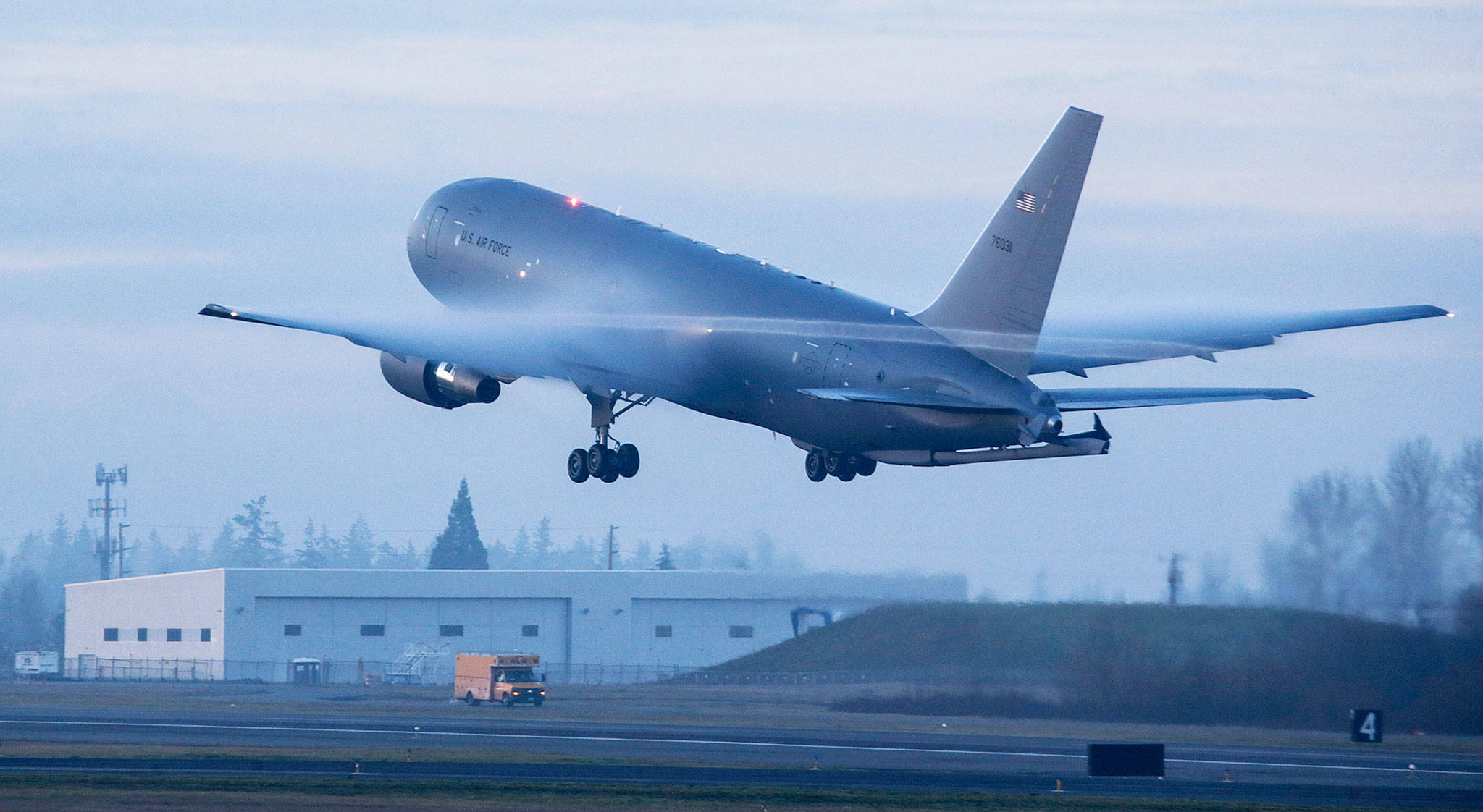By Tony Capaccio / Bloomberg News
The Air Force’s top military officer has sent the Boeing Co.’s new CEO a blunt reminder that the ill-fated 737 Max passenger jet isn’t the only troubled project he needs to rescue.
There’s also the company’s failure to provide a combat-ready aerial-refueling tanker, nine years after Boeing won a competition for the $44 billion project. The tanker is derived from the 767, and the airframe is assembled in Everett.
“We require your attention and improved focus on the KC-46,” General David Goldfein, the Air Force chief of staff, warned in a letter four days before Dave Calhoun took over as chief executive officer of the company. “The Air Force continues to accept deliveries of a tanker incapable of performing its primary operational mission.”
Calhoun has been entrusted with turning around a company that is reeling from a pair of crashes of the Max that killed 346 people and resulted in the grounding of its best-selling jet, sent its stock into a swoon and raised questions about its commitment to safety.
“As one of your largest military customers, we also rely on a relationship of trust and confidence in not only Boeing’s products” but also a long-term sustainment effort needed for equipment that “our warfighters require,” Goldfein said in the Jan. 9 letter made available to Bloomberg News.
Calhoun is leading a once-proud company whose reputation for engineering prowess is now in tatters. On top of the grounding of the Max, Boeing has suffered delays to the 777X jetliner and an embarrassing mishap that caused a new space capsule to miss a rendezvous with the International Space Station.
The letter got Calhoun’s attention: He met with Goldfein on Wednesday, according to a Boeing official familiar with the issue. The same day at a White House signing ceremony for the initial trade agreement with China, President Donald Trump singled out Calhoun, quipping that “he’s got a very easy company to run. He just took over Boeing.” The president added, “Let me tell you, it’s not your fault, you just got there.”
Larry Chambers, a spokesman for Chicago-based Boeing, declined to comment on the meeting with Goldfein or the letter. “Boeing is fully committed to addressing the Air Force concerns with the KC-46 program and devoting resources required to make the KC-46 fully mission capable,” he said.
Brigadier General Ed Thomas, a spokesman for Goldfein, said “at this point the chief intends for any communications with our industry partners to be between himself and them.”
In the letter, Goldfein expressed concern about the tanker’s crucial “Remote Vision System” and “additional unmet requirements.” The plane has multiple cameras used by an airman sitting at a console behind the cockpit to guide a 59-foot extended boom to connect with a plane needing fuel and then to monitor the procedure.
Shadows or the glare of the sun can hamper the cameras’ view on occasion, possibly resulting in scraping the plane being refueled or difficulty in performing the operation, according to the Air Force. Boeing officials have said they’ve deployed a software solution expected to overcome the main hurdle.
Despite agreement on a plan to repair the Remote Vision System, Goldfein said in the letter, “to date, progress has been unsatisfactory. More than a year has elapsed and Boeing has yet to provide” a design “that instills confidence in the way forward.”
“None of the timelines” in the agreement “has been met,” he said, “and Boeing’s latest proposal slips delivery of the final fix to the warfighter by over two years,” which he called unacceptable.
The Air Force has taken delivery of 30 tankers to start aircrew and logistics training even as Boeing continues to work on fixes. The service last year started to withhold a percentage of final payment per aircraft that’s now at about $800 million, according to Air Force spokeswoman Ann Stefanek.
“If we elect to continue accepting aircraft deliveries at the current rate,” the service will possess 70 “partially mission-capable” tankers by next year, Goldfein wrote.
The tanker also has begun combat testing conducted by Pentagon evaluators and so far “over 500 deficiencies have been tracked to date and we’ve only just begun,” Goldfein wrote. A Boeing official said none of the deficiencies are of the most serious category.
Goldfein told Calhoun he expects lawmakers to question during fiscal 2021 budget hearings why the Air Force continues to take delivery of an aircraft “not meeting multiple key performance parameters and a host of other requirements.”
Without a change in course, Goldfein wrote, “we will not be able to answer positively and we will have to acknowledge our serious concerns in two areas — trust and safety.”
Bloomberg’s Alan Levin contributed to this report.
Talk to us
> Give us your news tips.
> Send us a letter to the editor.
> More Herald contact information.

























